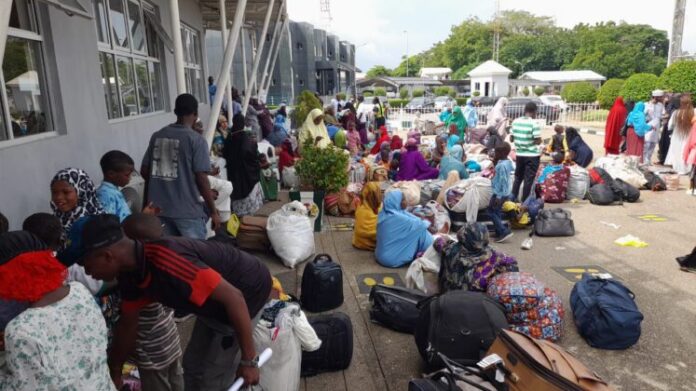Over 20,000 stranded Nigerians returned from Libya, Italy, others – Report
A total of 20,197 Nigerians who were stranded in various countries have voluntarily returned to Nigeria.
This data is based on information compiled from repatriation efforts facilitated by the International Organisation for Migration.
The stranded Nigerians returned to their country under the IOM’s Assisted Voluntary Return and Reintegration programme, which involved intervention from the Federal Government and various Nigerian missions abroad.
Women and girls constitute nearly 88 per cent of the returnees, while men account for 13 per cent.
Most VoTs fall within the age bracket of 18 to 39 years, with those aged 18 to 25 being particularly susceptible to recruitment by traffickers.
One of the reports read, “The stranded Nigerian migrants returned home from transit and destination countries along the Mediterranean irregular migratory route.
“From April 2017 to May 2018, over 7,000 of those returned from Libyan detention centres and urban areas while 750 were from neighbouring countries, mainly Niger and Mali.”
The agency also revealed that “19,452 Nigerians have been assisted to voluntarily return home between April 2017 and February 2022.”
Within the first quarter of 2024 alone, the IOM said it facilitated the return of 167 victims to Nigeria, 81 per cent of whom were female. However, this trend is not new.
In 2022, the number of female victims reached its peak with 908 identified cases, whereas male victims were significantly fewer, peaking at 166 in the same year.
In the period reviewed, economic instability was the predominant reason for irregular migration, with a staggering 94 per cent of VoTs citing the search for better economic opportunities as their primary motivation.
READ ALSO: Stranded Nigerian Air France passengers in Togo to return home tonight – NCAA
Only two per cent sought specific job opportunities, one per cent sought to escape adverse family situations, and 3 per cent had varied reasons, including education, family reunification and fleeing violence.
Italy, Libya, and Mali were among the top intended destination countries for the VoTs.
The three countries constituted nearly 60 per cent of all returnees, with Italy retaining its prominence, harbouring 26 per cent of returnees.
Other choices include Germany, Spain, UAE, France, Lebanon, Senegal, and Cote d’Ivoire. Among the returnees, Libya stood out as the leading country of exploitation, accounting for 53 per cent of abuse cases, followed by Mali with 29 per cent.
In the last two decades, Libya has served as a destination and transit point for millions of Nigerians embarking on the desperate journey to Europe through the Mediterranean.
Since the ousting of its former leader, Muammar Gaddafi, in October 2011 and the ensuing instability, there have been rising cases of alleged slave trade and extortion, which has reportedly become an income stream for Libyan communities.
On the nature of exploitation, most VoTs primarily faced forced labour and sexual exploitation.
Further details from the IOM showed that 1,114 victims, predominantly females (82 per cent), were exploited through forced labour in Libya, as Mali was noted for sex trade exploitation, affecting 1,109 victims, 98 per cent of whom were female.
The data also revealed that, although traffickers employed diverse means of control, physical and psychological abuses were prominently reported. Deception was another key method, combined with threats and withholding wages, ensuring victims remained trapped and subjugated.
Most VoTs reported being trafficked by friends or acquaintances, who accounted for 46.6 per cent female and 53.2 per cent male victims trafficked.
The IOM said it had partnered with various governmental and non-governmental actors to provide reintegration support to VoTs, with over 3,122 victims (64 per cent) successfully reintegrated into their communities.
“They have received assistance ranging from medical care to vocational training aimed at fostering their economic independence and resilience.
“The main source of stress for returnees who find themselves in a state of regret and limbo between what they planned to achieve and what they have at hand upon return is often the uncertainty about their future, source of income and their place within the community,” the report read.
The most vulnerable set of returnees were VoTs, survivors of Gender-Based Violence, unaccompanied minors, those with severe mental and psychosocial needs, physical health needs, and those exposed to violence or who experienced other forms of exploitation.
Follow the Neptune Prime channel on WhatsApp:
Do you have breaking news, interview request, opinion, suggestion, or want your event covered? Email us at neptuneprime2233@gmail.com





